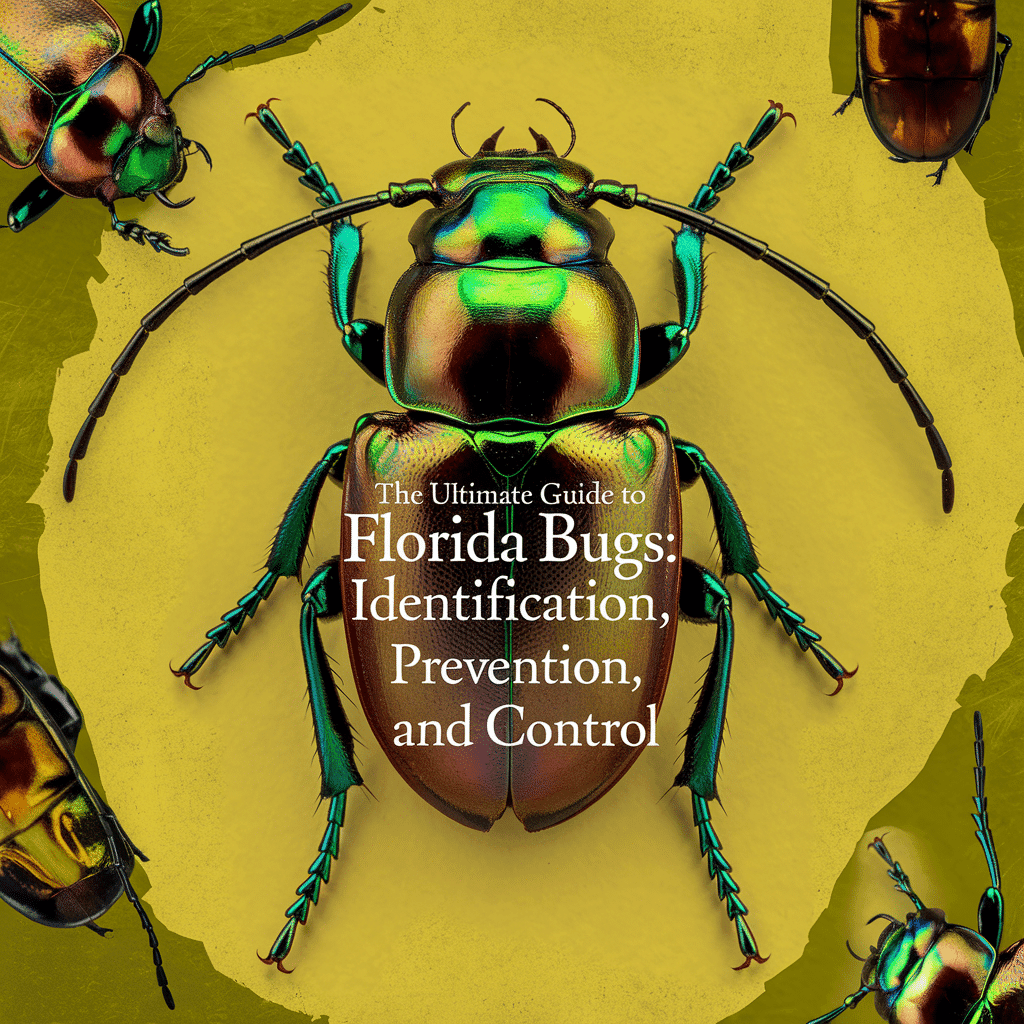Florida’s warm, humid climate creates the perfect environment for a wide variety of insects and pests to thrive year-round. As a homeowner or resident in the Sunshine State, understanding the most common bugs you’ll encounter and how to effectively manage them is crucial for maintaining a comfortable living space. In this comprehensive guide, we’ll explore the diverse world of Florida bugs, providing expert insights on identification, prevention, and control methods to help you keep your home pest-free.
Common Bugs in Florida: Know Your Adversaries
Florida’s ecosystem supports an incredible diversity of insect life. Here are some of the most prevalent bugs you’re likely to encounter:
Ants
Ants are ubiquitous in Florida, with several species causing problems for homeowners1. The most common types include:
- Fire Ants: Known for their painful stings and large mounds
- Ghost Ants: Tiny, pale ants often found in kitchens and bathrooms
- Carpenter Ants: Large black ants that can damage wooden structures
- Pharaoh Ants: Small, light-colored ants that are difficult to control
Prevention and Control:
- Seal entry points around your home’s foundation, windows, and doors
- Keep food in airtight containers and clean up spills promptly
- Use bait stations or gel baits for targeted control
- For severe infestations, consider professional pest control services
Cockroaches
Cockroaches are resilient pests that can survive in various environments. In Florida, you’re most likely to encounter:
- American Cockroaches (Palmetto Bugs): Large, reddish-brown roaches often found outdoors
- German Cockroaches: Smaller, light brown roaches commonly found in kitchens and bathrooms
- Asian Cockroaches: Similar to German cockroaches but more likely to be found outdoors
Prevention and Control:
- Maintain a clean, clutter-free home, especially in kitchen and bathroom areas
- Seal cracks and crevices where roaches may hide or enter
- Use cockroach baits and traps strategically placed in problem areas
- Consider professional treatments for severe infestations
Mosquitoes
Florida’s warm, humid climate and abundance of standing water make it a haven for mosquitoes1. These blood-sucking insects are not only a nuisance but can also transmit diseases.Prevention and Control:
- Eliminate standing water around your property
- Use mosquito repellents when outdoors
- Install or repair screens on windows and doors
- Consider professional mosquito control services for your yard
Termites
Termites are a significant concern for Florida homeowners, causing millions of dollars in damage annually. The two main types in Florida are:
- Subterranean Termites: Live in the soil and build mud tubes to access wood
- Drywood Termites: Live directly in the wood they infest
Prevention and Control:
- Schedule regular termite inspections
- Maintain proper drainage around your home’s foundation
- Remove wood-to-ground contact around your property
- Consider professional termite treatments, such as baiting systems or chemical barriers
Bed Bugs
While not unique to Florida, bed bugs can be a persistent problem in homes and hotels. These small, reddish-brown insects feed on human blood and can quickly infest bedding, furniture, and other soft furnishings1.Prevention and Control:
- Inspect second-hand furniture before bringing it into your home
- Use protective covers on mattresses and box springs
- When traveling, check hotel rooms for signs of bed bugs
- For infestations, professional heat treatments or chemical applications are often necessary
Flies
Various species of flies can be problematic in Florida, including:
- House Flies
- Fruit Flies
- Drain Flies
- Blow Flies
Prevention and Control:
- Keep garbage in sealed containers and dispose of it regularly
- Clean up pet waste promptly
- Use fly traps or sticky strips in problem areas
- Ensure proper drainage in sinks and other wet areas
Spiders
While most spiders in Florida are harmless, some species can be dangerous. Common spiders include:
- Wolf Spiders
- Orb Weavers
- Black Widow Spiders
- Brown Recluse Spiders (rare in Florida)
Prevention and Control:
- Seal entry points around your home
- Remove clutter and debris where spiders may hide
- Use sticky traps in corners and along baseboards
- Consider professional pest control for persistent spider problems
Seasonal Pest Activity in Florida
Understanding the seasonal patterns of pest activity can help you better prepare for and prevent infestations. Here’s a general overview of pest activity throughout the year in Florida:
Spring (March – May)
- Ant activity increases as colonies expand
- Termite swarms become more frequent
- Mosquito populations begin to rise
Summer (June – August)
- Mosquito activity peaks
- Cockroach populations thrive in the heat and humidity
- Flies become more prevalent
Fall (September – November)
- Rodent activity increases as they seek shelter from cooler temperatures
- Some ant species may move indoors
- Spider sightings may become more common
Winter (December – February)
- Pest activity generally decreases, but Florida’s mild winters mean some pests remain active year-round
- Indoor pests like cockroaches and ants may still be problematic
Integrated Pest Management: A Holistic Approach to Pest Control
Integrated Pest Management (IPM) is a comprehensive approach to pest control that focuses on long-term prevention and management rather than relying solely on chemical treatments. Here are the key components of an effective IPM strategy:
- Inspection and Monitoring: Regularly inspect your property for signs of pest activity and identify potential entry points or harborage areas.
- Prevention: Implement measures to prevent pest infestations, such as sealing entry points, reducing moisture, and proper food storage.
- Cultural Controls: Modify the environment to make it less attractive to pests, such as improving sanitation and reducing clutter.
- Mechanical Controls: Use physical methods to control pests, such as traps, barriers, or manual removal.
- Biological Controls: Utilize natural predators or parasites to control pest populations when appropriate.
- Chemical Controls: Use pesticides judiciously and only when necessary, selecting the least toxic options that are effective against the target pest.
By implementing an IPM approach, you can effectively manage pest problems while minimizing the use of chemical pesticides and their potential impact on the environment and human health.
Eco-Friendly Pest Control Methods
As awareness of environmental issues grows, many homeowners are seeking more sustainable and eco-friendly pest control options. Here are some effective, environmentally conscious methods for managing common Florida pests:
- Diatomaceous Earth: This natural, powdery substance can be used to control a variety of crawling insects, including ants, cockroaches, and bed bugs. It works by physically damaging the exoskeletons of insects, leading to dehydration.
- Essential Oils: Certain essential oils, such as peppermint, eucalyptus, and tea tree oil, can repel various pests. These can be used in diffusers or diluted and applied as sprays.
- Neem Oil: Derived from the neem tree, this natural insecticide can be effective against a wide range of pests, including aphids, whiteflies, and some caterpillars.
- Beneficial Nematodes: These microscopic worms can be applied to soil to control various lawn and garden pests, including grubs, fleas, and fungus gnats.
- Boric Acid: A naturally occurring compound that can be used to control ants, cockroaches, and other crawling insects. It’s relatively low in toxicity to humans and pets when used as directed.
- Companion Planting: Certain plants can repel pests or attract beneficial insects. For example, marigolds can deter mosquitoes, while lavender can repel moths and flies.
- Natural Predators: Encourage beneficial insects and animals that prey on pests. For example, bats and purple martins can help control mosquito populations.
While these methods can be effective for minor pest issues, it’s important to consult with a professional pest control service for severe infestations or when dealing with potentially dangerous pests like termites or venomous spiders.
The Impact of Climate Change on Florida’s Pest Populations
Climate change is having a significant impact on pest populations in Florida. As temperatures rise and weather patterns shift, we’re seeing changes in the distribution, life cycles, and behavior of many insect species. Here are some key trends to be aware of:
- Extended Active Seasons: Warmer temperatures mean that many pests remain active for longer periods throughout the year, potentially leading to more generations per season and larger overall populations.
- Range Expansion: Some tropical and subtropical species are expanding their ranges northward, introducing new pest challenges to areas that previously didn’t experience them.
- Increased Reproduction Rates: Higher temperatures can accelerate the life cycles of many insects, leading to faster reproduction and population growth.
- Changes in Pest-Plant Interactions: Shifts in temperature and precipitation patterns can affect the timing of plant growth and insect emergence, potentially disrupting natural pest control mechanisms.
- Increased Vector-Borne Diseases: Climate change may increase the prevalence of mosquito-borne diseases like Zika, dengue, and West Nile virus in Florida.
These changes underscore the importance of staying informed about pest trends and adapting pest management strategies accordingly.
When to Call a Professional Pest Control Service
While many minor pest issues can be managed with DIY methods, there are situations where professional pest control services are necessary. Consider contacting a professional if:
- You have a severe or persistent infestation that doesn’t respond to home treatments.
- You’re dealing with potentially dangerous pests like venomous spiders or stinging insects.
- You suspect a termite infestation, which requires specialized treatment.
- You’re experiencing recurring pest problems despite your best efforts.
- You need assistance identifying the type of pest you’re dealing with.
- You want to implement a comprehensive, long-term pest management plan.
Professional pest control services have access to more potent and targeted treatments, as well as the expertise to apply them safely and effectively. They can also provide valuable advice on preventing future infestations and maintaining a pest-free home.
Choosing the Right Pest Control Company
When selecting a pest control company in Florida, consider the following factors:
- Licensing and Certification: Ensure the company is licensed by the Florida Department of Agriculture and Consumer Services and that technicians are properly certified.
- Experience and Reputation: Look for companies with a proven track record in dealing with Florida’s unique pest challenges. Check online reviews and ask for references.
- Treatment Methods: Inquire about the company’s approach to pest control. Do they use IPM principles? Do they offer eco-friendly options?
- Guarantees and Follow-up Service: Reputable companies often offer guarantees on their work and provide follow-up services to ensure the problem is resolved.
- Insurance: Verify that the company is properly insured to protect you in case of accidents or damage during treatment.
- Transparency: The company should be willing to explain their treatment methods, products used, and provide detailed quotes.
- Customized Solutions: Look for a company that tailors their approach to your specific pest problems and home environment rather than offering one-size-fits-all solutions.
Conclusion: Maintaining a Pest-Free Florida Home
Living in Florida means coexisting with a diverse array of insects and other pests. However, with the right knowledge and strategies, you can effectively manage pest issues and maintain a comfortable, pest-free home. Remember these key points:
- Prevention is key. Regular home maintenance, proper sanitation, and eliminating potential pest habitats can go a long way in preventing infestations.
- Stay informed about the common pests in your area and their seasonal patterns.
- Implement an Integrated Pest Management approach for long-term, sustainable pest control.
- Consider eco-friendly pest control methods when appropriate.
- Don’t hesitate to call in professional help for severe or persistent pest problems.
By staying vigilant and proactive in your pest management efforts, you can enjoy all the benefits of Florida living without the nuisance of unwanted insect guests. Remember, a pest-free home is not just about comfort – it’s about protecting your health, your property, and your peace of mind.

17 Years of Pest Control Experience Founder and Owner of Dade Pest Solutions Proud Resident of South Florida
Shaun Judy, a dedicated South Florida native, is the founder and driving force behind Dade Pest Solutions. With over 17 years of hands-on experience in the pest control industry, Shaun has built a reputation for reliability, results, and real local knowledge. His journey began with a deep commitment to protecting homes from pests using proven methods and innovative solutions. Raised with a strong work ethic and a passion for service, Shaun treats every property as if it were his own—delivering expert care with a personal touch.

